Electric dreams: The inside story of the rise and rise of the Adelaide duo taking on the world at Eurovision
The homegrown heroes tell us how they met, what it means to be representing the country, defying labels and how this song came to life in an Adelaide storage shed.
SA Weekend
Don't miss out on the headlines from SA Weekend. Followed categories will be added to My News.
Eclectic, energetic, diverse, fun, electric … welcome to the weird and wonderful world of Electric Fields, the homegrown heroes carrying the nation’s hopes in the annual celebration of all that is ritzy and glitzy in international music: Eurovision.
The journey for Zaachariaha Fielding and Michael Ross, who will become the first duo to represent Australia at the competition, is something to behold.
Fielding grew up in South Australia’s Anangu Pitjantjatjara Yankunytjatjara (APY) Lands before blossoming into an international artist and musician.
Together with keyboard player, composer and producer Michael Ross, they formed the colourful and genre-defying electronic duo Electric Fields, who merge traditional culture with cosmic pop (often referred to as something akin to “Daft Punk meets Nina Simone in Deep Forest”).
Fielding’s soaring feminine vocals and floating frocks put them at the front of the field of musicians competing to represent Australia in the Eurovision Song Contest.
Now in Malmo, Sweden, preparing for the show, they are about to bring their song One Milkali (One Blood) to the world.
Ross describes the tune, released by Sony Music in March, as a uniquely South Australian production.
“We actually wrote some of the lyrics in a Kennard storage unit on Port Rd in Thebarton. I was moving house and we had set our studio up in the storage unit,” Ross says, with a laugh.
“The song was written on Kaurna country in Adelaide and it’s been recorded, produced and mixed, all in this state.
“It’s very much an artistic expression from South Australia, and we like it that way.
“The amount of support that artists actually get in Adelaide … they just nurtured us right from the start.”
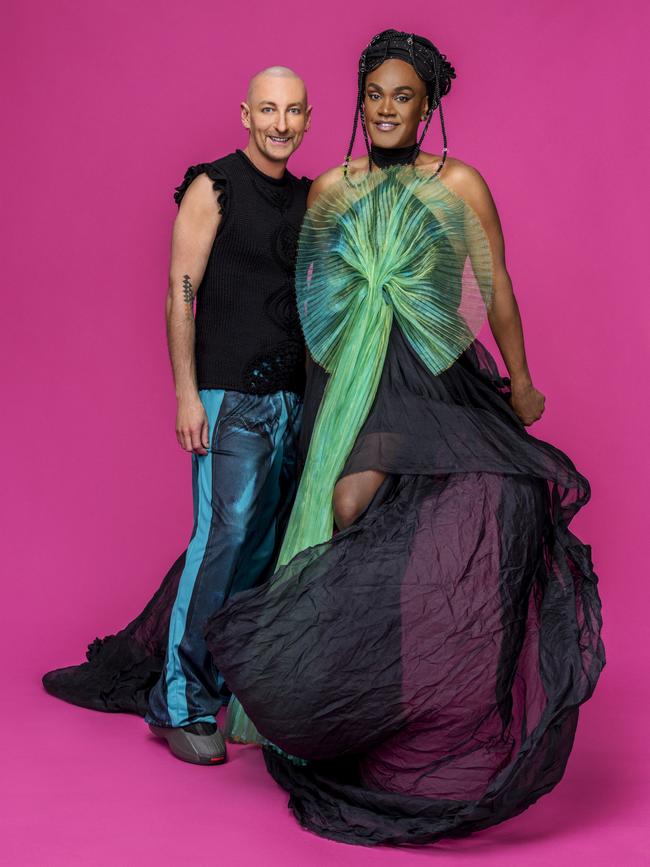
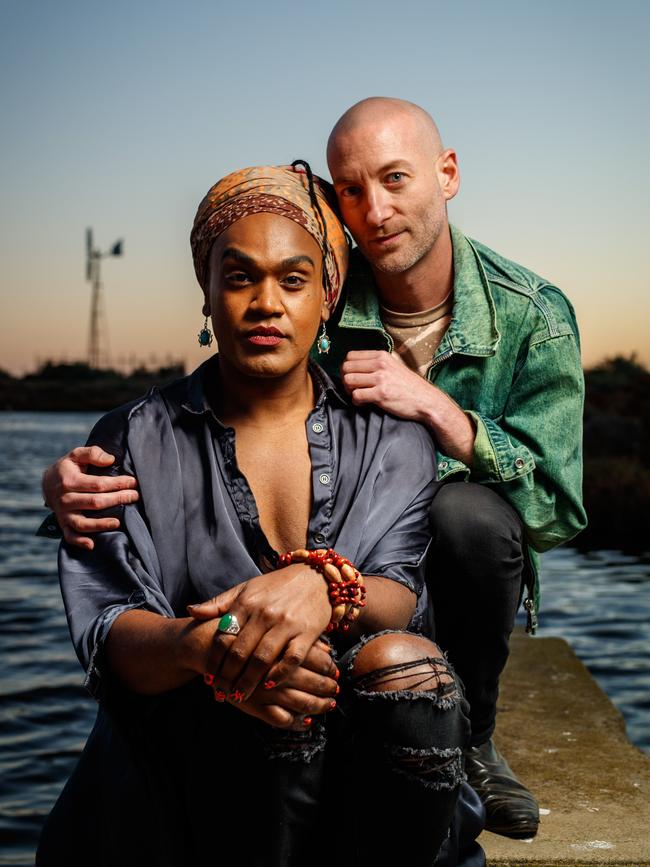
Music bible Rolling Stone can barely contain its excitement about the strength of One Milkali (One Blood), describing it as “perfectly” capturing the Electric Fields vision.
“With its anthemic chorus and incorporation of Aboriginal language … the duo might just be a surprise package in this year’s competition,” Rolling Stone wrote.
Ross says the song, which also features Kaurna Narungga man Jamie Goldsmith on the yidaki (didgeridoo), is focused on “human connection”.
“It’s about how we are all connected,” he explains. “The way we have expressed that connection is through blood cells and atoms and how we all share the same atomic make-up … the same blood.
“Hopefully we can remind people that we’re all the same, and that is a great excuse not to fight each other.”
Ross describes the feeling as “magical” when they received confirmation they would be performing at the global event, which is watched annually by more than 150 million people.
For Fielding, it’s a far cry from Mimili, a tiny community about 100km south of the SA/Northern Territory border, where they grew up as the oldest of nine brothers and sisters.
As Fielding told this publication in 2021, they were sent down to Adelaide to complete school, and found themselves with a foot in two worlds.
“I moved to Adelaide to do years 10, 11 and 12 at Woodville High School,” they say.
“It was really good, it was a multicultural school, and that was my first taste of Western people.
“I just found it a natural to be the oldest in my family, and because I’d had a taste of the Western world I was able to come home and teach this part of the culture as well as Anangu culture.”
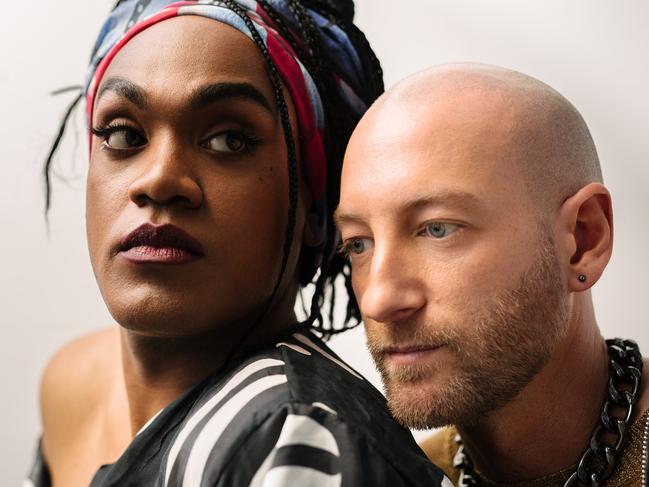
However, negotiating high school is a tricky path for any kid, with a few more obstacles if you’re a gay, Indigenous kid trying to find your way in the city.
“I remember feeling very vulnerable and not really knowing how to act around people, already knowing that I was different,” Fielding said at the time.
“Socially, it was difficult. How much of your limp wrist do you show? How do you move in your body?”
Ross continues: “(Fielding) had to navigate this ‘do you not like me because I’m Aboriginal or do you not like me because I’m gay?’ Oh, it’s that reason, OK.”
“It was the language barrier as well,” Fielding says.
“I speak a lot of English at home, but they use it differently here.”
And it’s this range of experience they’ve fed into their art, which saw Electric Fields almost make it to Eurovision in 2019, when they were runner-up to Kate Miller-Heidke.
Since then, they have matured as people and musicians, and have earned their place on the world stage.
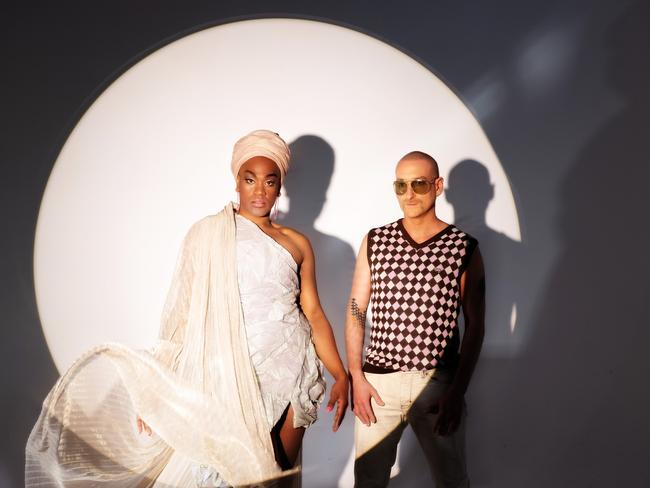
THE X FACTOR
Did you really meet on The X Factor? What did you see in each other and how did that friendship evolve into Electric Fields?
Michael: We met a few years before X Factor. Zaachariaha had been on in 2012 and I went on in 2013 but we met I think in 2010 or 2011 – gosh, my grip on time ended during the lockdowns.
Zaachariaha: I was singing some songs for a university lecturer named Robyn – she’d written some great pop songs and wanted me to sing them for her. She needed a music producer and that’s when I met Michael, who is now my tjutja, which means older brother in my language.
M: Then Zaachariaha called me up in 2015-ish and asked if we could work on some music. That’s when we started to write songs together. We knew we were on to something because it brought us huge joy to create together.
Z: That’s when we birthed the Electric Fields energy that we are now the proud parents of.
THE MUSIC
How has your music evolved from two very different people into the one as it has in the song you will take to Eurovision, One Milkali? How have you both changed by playing together?
Z: We’ve grown as individuals over the past eight years. We understand better how our minds work and how the mental chitter chatter sometimes wants to trip you up and create a rocky pathway. We get to examine the medicine we need for ourselves when we write lyrics and weave them on to the musical canvas.
M: I believe humans are way more similar than we are different and the medicine we create for ourselves can be transposed to anyone who connects to the stories we share in our music.
And now we’ve written for so many different projects, like a lullaby for ABC Kids TV, eight film music pieces for Baz Luhrmann (for Faraway Downs, Luhrmann’s extended TV series of his film Australia) and the Lighting of the Sails for the Sydney Opera House.
These challenges have helped us expand our compositional chops.
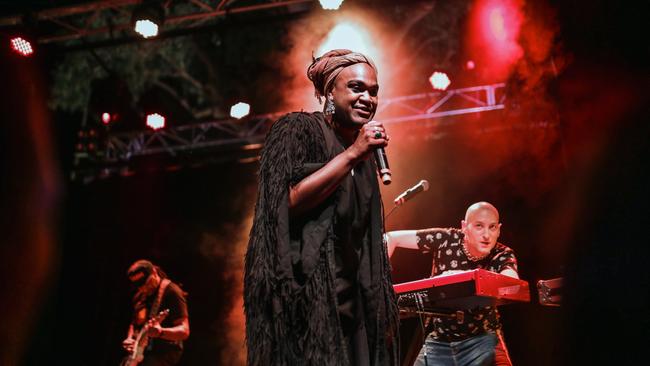
BACKGROUNDS
Zaachariaha, how was your talent encouraged while you were growing up in the APY Lands? What languages do you speak and sing in?
Z: I sing in Pitjantjatjara and Yankunytjatjara, two of Australia’s oldest languages. It’s something that is very special to me because I grew up learning Anangu (central Australian Aboriginal) traditional song and dance from my grandmothers and grandfathers.
It’s the same energy I use when I’m painting on canvas.
Michael, you are a composer, musician and producer originally from Queensland who started out performing pop soul songs like Diana Ross’s You Can’t Hurry Love. How did you transition into embracing traditional language and culture through your music?
M: When we write together, we bring our true selves to the table. I bring my philosophy and lessons from a tough upbringing being gay in a community that was yet to open up to difference.
So, when I co-write with Zaachariaha, her cultural elements naturally get woven into our collaboration. Lore women and lore men from Mimili have taken me under their wing and taught me language.
I’ve also learned so much from the Aboriginal musicians we’ve become close with while touring around Australia.
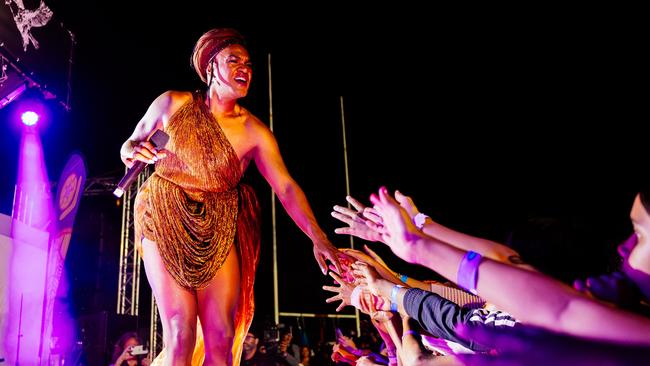
EUROVISION
Tell me about auditioning to represent Australia, because you had been close before. And can you explain more about the song One Milkali which has references to Aboriginality, but also to the cosmic “golden ratio” (0.618, the building block of nature)?
Z: At Eurovision Australia Decides five years ago, we gave our first live performance on television as Electric Fields. So we were learning how it felt to work with that energy.
M: One Milkali (One Blood) uses two languages to sing about One Blood. It speaks to how we’re all connected.
We use the connecting patterns in nature as a mirror. The 0.618 (golden ratio) is seen in the shape of unfathomably giant galaxies, and the small seed patterns of a flower. We are trying to express how insignificant our differences are in the face of a vast universe.
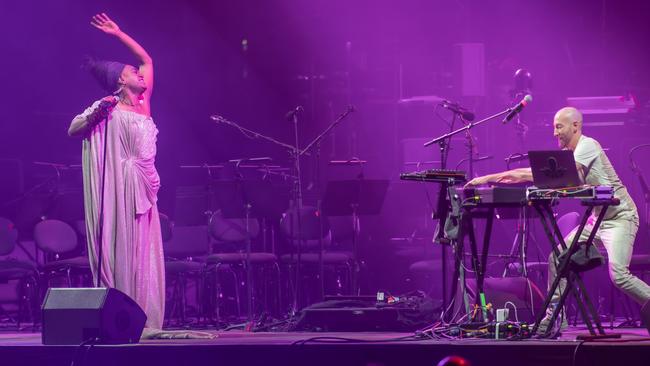
LABELS
I know you both dislike labels and boxes, but how do you describe yourselves and your music? And Zaachariaha, what will you be wearing in Malmo?
M: We create music that we personally love to hear ourselves. So, we don’t stick to a particular genre because the story we’re sharing as we write will have its own texture and musical colour.
Z: We’ve held to an idea of “bypassing the barriers” since we began Electric Fields, painting stories on to a canvas you can hear. I’ll be wearing something very beautiful that I co-designed with Kyah. I work with Kyah on all of my performance outfits and she’s a very talented designer. And she’s coming with us to Malmo.




